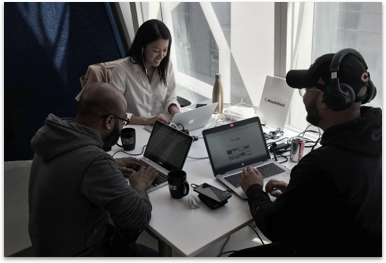Read oc ra cy
Reading x Meritocracy, Democracy
About Us / Our Story

Hi. Our names are Mario and Matei Vasilescu. We’re brothers and co-founders of Readocracy. This is the third platform we’re building together. More on our backgrounds, and our team, below.
First, let us tell you how Readocracy came to be, and why we have committed our lives to it.
Readocracy
We first had the idea for Readocracy in 2016, and it hasn’t changed much: what if we could give people credit for all the attention they invest online? Not just for a few ad dollars here and there, but in terms of their relationship to knowledge. Don’t we live in a reputation-driven, knowledge economy? What if you could use your time to prove yourself?
2016 was long before Cambridge Analytica or any of the infinite scandals, studies, and documentaries that have made people intensely mindful about their time online. As a result, at the time, we were told the idea was too niche: “who cares about their attention / internet habits this much?”
Early trials proved otherwise. And we were convinced that the market would come around in our favour. The way that attention was being monetized online was on the path to collapse. It’s something we’ve written about and spoken about at the world’s leading media and journalism conferences. (Long before the recently published Subprime Attention Crisis.)
So we did something unconventional: we decided to build a strategic pre-product that would allow us to test and scale our attention-verification technology with publishers first. That was Readefined, and it processed over 100 million page views for publisher partners who piloted with us. It also won recognition and support from IBM, Thomson Reuters, and others. Critically, it also gave us an extremely deep understanding of the broader content ecosystem, including the impact Surveillance Capitalism was having on publishers, audiences, and society. There had to be another way to value our attention, and we felt we were sitting on it.
So we took the plunge and finally pursued the vision. In the year since we’ve let in the very first test user, the private beta has seen our early members read over 45,000 articles and earn over 95,000 subject matter credits. in November 2020 we won a Mozilla Builders Award for their FixTheInternet Open Lab, only 1 of 3 winners out of over 1,500 applicants. In march of this year we were a Finalist at SXSW. And we’re just getting started.
Why we are so committed
To understand our passion, you need to understand our backstory.
We’re the sons of first-generation immigrant parents who escaped communism not just to give us a better life, but more specifically to raise us in a democracy: where you had freedom to think, and there were no limitations on speaking truth to power and doing what was right. So we’ve heard the powerful, personal stories, of what happens when you need to start from scratch and prove yourself with nothing. And the stories of what happens when democracy disappears. When information is weaponized.
These same parents left behind a family with an incredible story. Grandparents, and great grand-parents, who were humble pioneers that shaped entire industries and fields — inventors and teachers and leaders — who accomplished incredible things but were most notable for their intellect, integrity, and kindness . These were the role-models we grew up with, the stories we heard.
And on this backdrop, we grew up increasingly frustrated with the state of the world. To put it bluntly, why were charlatans everywhere winning? Why did it seem to be a handicap to be honest and informed? A financial risk to focus on quality instead of quantity? It seemed to be a world ruled by the polar opposite of everything those role models stood for. Ignorance, manipulation, superficiality.
The name Readocracy comes from Reading x Meritocracy, and Democracy. It’s our way of fighting back in a systemic, sustainable way. We believe it can help shape a future where being well-informed and helpful can be proven and rewarded. Where power and influence aren’t defined only by the quantity of attention you get, but equally by the quality of attention you give. And where we are more mindful of how we invest our attention, rather than perpetually mindless.
So that we can live in a less easily manipulated world, one where more people who put in the work get the recognition they deserve, regardless of their background. A world where democracy isn’t so effortlessly threatened.
We guarantee you will not find founders more committed to their big picture problem, or who have thought more deeply about it.








